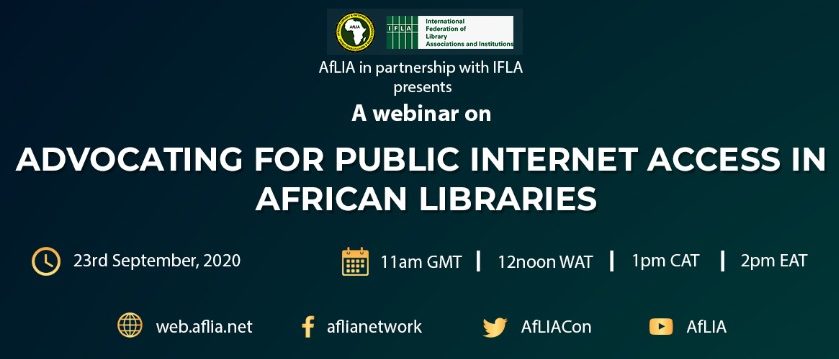Webinar: Advocating for public internet access in African Libraries

SEPTEMBER 15, 2020
As teaching and learning increasingly move online due to the COVID-19 crisis, the digital and educational divide in Africa is steadily widening as many students lack access to the Internet and household computers/Internet enabled devices and are unable to join classes or complete assignments online. This hinders access to information and knowledge for students and lifelong learners. According to UNESCO, in sub-Saharan Africa, 89% of learners do not have access to household computers and 82% lack internet access. The consequences of this are worrisome considering how it may push more children out of formal education system. Already, sub Saharan Africa has the highest number of out of school children and youth globally.
Libraries may be able to intervene and offer support through improved public access, provided they are equipped with internet connectivity which they are able to continue sharing – even when the library doors are closed. Different countries in Africa have different laws guiding internet connectivity within their boundaries. There is no one-size fits all policy that will make public Internet access available in libraries throughout the continent. However, the African Libraries and Information Associations and Institutions recognizes that National Library Associations in African countries can be equipped with the knowledge and skills to push through policies that can see this achieved in their various countries. This call for sustainable systematic advocacy at different levels led at national levels by Library Associations.
Recognizing the many thrusts of IFLA in creating awareness and driving policy about public internet access in libraries especially the organization’s experience in advocating for library connectivity and public access at the Internet Governance Forum and WSIS, AfLIA is partnering with the global body to present a webinar to officers of National Library Associations all over Africa on how to lead the efforts on public Internet access for libraries in the continent.
The webinar will be on 23rd September, 2020 at 11am GMT/ 12noon WAT/ 1pm CAT / 2pm EAT). The session will highlight;
- the roles libraries can play in bridging this digital divide
- exploring available Internet Governance platforms and mechanisms that Associations and libraries can make use of in advocating for making public Internet access available in libraries and policies that support it and
- how to build up their capacity for advocacy in this field.
Target Audience
The webinar is meant to educate members of the National Library Association Section AfLIA – that is officials of Library Associations in Africa at the national, State, Regional and Municipal levels on public access to Internet through libraries. Other interested library professionals including Library educators could also gain from the sessions.
Registration
This is a free webinar. Completing the registration form automatically enrols you.
Carefully read the section on Technical Requirements to help you prepare adequately for this webinar.
Technical Requirements
Upon registration, reminders will be sent to all registrants periodically. This webinar will be hosted on Zoom Conferencing Platform. Participants, who do not have Zoom on their mobile devices and or computers, need to download, install and create an account on Zoom ahead of time (CLICK TO DOWNLOAD). Webinar attendees are encouraged to join early, preferably 15 minutes before the start of the webinar, as one may need time launch the application. The speaker will use a webcam to connect with attendees. Audio and video for the session will be streamed over computer speakers. Attendees are therefore encouraged to connect with a headset or earpiece for maximum utility. Please note that this webinar does not involve certificate of participation.
Webinar Materials
A list of resources and further information will made be available at the end of the webinar, to enable thorough engagement with the webinar content. All registrants will have access to the presentation slides. The webinar recording will be uploaded on AfLIA Youtube Channel soon after the webinar to facilitate continuous engagement with the webinar content by webinar attendees and non-attendees. Webinar attendees who are fully present for webinar may be eligible for a certificate of participation from AfLIA.
Queries
For further enquiries and assistance about the webinar contact us at afliacomm@aflia.net. You may also reach out to the Chairperson, National Library Associations Section, AfLIA Comfort Asare (comfortakwaa@gmail.com)
